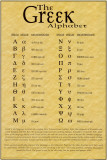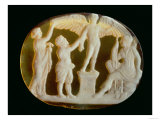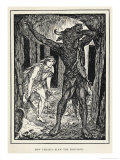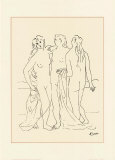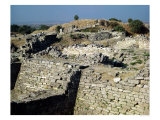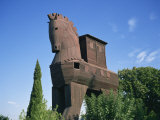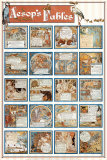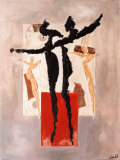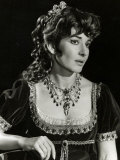|
|
|
|
|
|
|
|
Daedalus & Icarus
The name Daedalus means “Cunning Worker”, whose most cunning work may have been the wings he created from feathers and wax so he and his young son Icarus could escape from King Minos who had imprisoned them to prevent the secret of the labyrinth leaving Crete.
Daedalus is described first by Homer, and then by Ovid, with creating labyrinths to keep the Minotaur, a ferocious half man - half bull creature that was the offspring of a god in the form of a bull and female human.
|
|
|
|
Orestes, the son of Clytemnestra and Agamemnon, avenged his father's murder by his mother, by killing his mother.
A krater is a very large vase that was used to mix wine and water for a ‘symposium’, which originally meant a drinking party.
Attic refers to a historical region of Greece centered on the Attic peninsula, which projects into the Aegean Sea.
|
|
|
|
The Three Graces
In Greek mythology the goddesses of “Beauty”, “Mirth”, and “Good Cheer” (Aglaea, Euphrosyne, and Thalia) are collectively called the Three Graces.
|
|
|
|
|
|
|
The historic city of Troy, both factual and legendary, is located in northwest Anatolia in what is now Turkey between the Dardanelles and Mount Ida.
Troy is best remembered for being the focus of the Trojan War described in the Iliad and the Odyssey, two epic poems attributed to the ancient Greek poet Homer.
• The Iliad and Odyssey [BOX SET]
• Odysses poster
• horses posters
|
|
|
|
Odysseus and the Sirens, Athenian Red Figure Stamnos Vase by The Siren Painter
• explorers posters
|
|
|
|
|
|
|
Buildings on Top of and Below Volcanic Cliffs (Thira), Santorini Island, Greece Fine Art Print
• volcano posters
|
|
|
|
Windmills on the Island of Mykonons, Greece
|
|
|
|
Zorba the Greek (1946) is a novel written by Nikos Kazantzakis. The character ‘Alexis Zorba’ represents the Dionysus spirit of ecstatic, spontaneous will to live opposed to the young Greek intellectual narrator's order and rationality represented by the Greek god Apollo (see Nietzsche).
Kazantzakis (b. 2-18-1883, Crete; d. 10-26-1957, Germany), considered by some the most important Greek philosopher of the 20th century, his epitaph reads "I hope for nothing. I fear nothing. I am free."
|
|
|
|
|
|
|
|
|
|
|
previous page | top | Greece 1 | 2 < Ancient Greek Civilization
|
|
I have searched the web for visual, text, and manipulative curriculum support materials - teaching posters, art prints, maps, charts, calendars, books and educational toys featuring famous people, places and events - to help teachers optimize their valuable time and budget.
Browsing the subject areas at NetPosterWorks.com is a learning experience where educators can plan context rich environments while comparing prices, special discounts, framing options and shipping from educational resources.
Thank you for starting your search for inspirational, motivational, and educational posters and learning materials at NetPosterWorks.com. If you need help please contact us.
|
|
|












